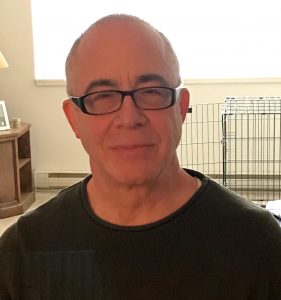It’s important to know where you came from to establish where you should be aiming to go. We here at Xperience like to think that we’re charting a new course and doing our own thing. And in large part, we are. But it was not creatio ex nihilo. There were publications and zines before us. And there was one, free, that simply by its delivery there made a place “cool.” This was Metroland.
Peter Iselin was the founder, owner, editor and publisher of this slice of Americana. And though he moved on from it, he by no means withered. He’s currently a talent manager and music rights consultant. I am honored to bend his ear.
I sit down with Peter and we discuss the aerodynamics of newsprint airplanes.
RRX: I wanted to interview you for being the founder of Metroland, which, from my perch would be a fantastic read. But in looking for you online, I found your bio as a talent manager. Not knowing for sure if it was you, I decided I was also going to interview that guy too. Kismet. So maybe I should just ask you what you’re up to at the current minute?

Peter Iselin. Photo provided.
PI: The talent manager sobriquet is a bit misleading. I did manage musical talent, I really managed composers and music supervisors and I lived in LA for 13 years, from ’95 to 2008. In the process, I also learned the music publishing business. What I do now, from my humble home in Brunswick, is work for a company in LA, and we license music and sound design for movie trailers and television promos, if that makes any sense; a music library. I basically run the business end of it.
It gets complicated; there’s a local angle to this, in that the founder of this company, called Q-Factory, is a guy by the name of Robert Etoll. And you may recognize Etoll from Ted Etoll, as in Upstate Concert Hall. Ted is Robert’s brother. But Robert founded and built this company. He has since sold much of his interest in it, but he continues to be the creative director. So there’s a Troy connection, cause he and Ted are both from Lansingburgh. He and I were roommates at Berklee College of Music, talking about Robert now. And we subsequently played in a band together for a few years. So we’re old friends.
So after doing various gigs in the music business in LA, I ultimately started working for him about seven years ago and I’ve been doing that ever since. My title is Vice President, Finance and Business Affairs. Although at this point, I’m basically chief operating officer, and I report to the owners.
RRX: When I think “talent management,” I think actors and Hollywood over musicians, and I don’t know why. Maybe it’s that our culture takes musical talent at some unmentionable “given.” But managing musical talent brings to mind ridiculous riders and hotel party sin-eating. Where’s the reality of music and talent management?
PI: Well, I knew enough never to try to manage a band, or even a solo artist, having been a musician myself. I’m a keyboard player by training. I instead gravitated toward people who write music for film and television – this is twenty-something years ago – the only guy I had a hand in managing his talent, if you want to put it that way (I wouldn’t) … I was kind of responsible for bringing Jimmy Fallon up out of obscurity into the LA comics’ scene, and I, in fact, introduced him to his first manager. First real manager – not anymore, but – So, that’s a whole other story…
RRX: It’s a story we’d love to hear.
PI: It’s interesting. So I sold Metroland in ’95. In 1994, some of my staff decided that putting out a weekly newspaper wasn’t difficult enough. They wanted to try to do a sketch comedy show. We got a sponsor, and we got a deal with Channel 23, which was independent at that point, Fox 23, and we put together a half-hour comedy show. Which was terrible, but the upshot was that one of the people cast in it was a sophomore at Saint Rose named Jimmy Fallon, who was very impressive at the audition. And he ended up writing or co-writing some of the sketches and performing in them. And, you know, clearly a talented kid.
We ended up hiring him at Metroland. Back then, you know, everything that was in classifieds, you took them over the phone. And he was a receptionist, classified ads, personal ads, all that kind of stuff. He was still there when I sold it, still working there. He was also going to Saint Rose at the same time, you know. Right before I left for LA, having sold the paper, Jimmy came up to me kind of shyly with a VHS tape and said, “I do stand-up, I don’t know if you know that. I do local clubs. So here’s my tape, if there’s anybody you can play it for when you get out there, you know, maybe you can help me.” I said “Sure, sure.”
That was August. It sat in my desk until November of that year, in my new office in LA. I was working for a talent management company. I was there to handle musicians. And one day, opening the bottom drawer of my office, I saw the tape, and was like “aw jeez, I never even watched this myself.” So it was a Friday afternoon, and I assembled the small team we had in the office – they were former agents turned managers, but they were all very young – and I assembled these people in the conference room. It was a Friday afternoon, before everybody left for the weekend.
I said “Guys, do me a favor. I promised this kid back home I’d play his tape for people. So give me a couple minutes, let’s take a look at it.” And remember, I had never watched it. So we put the VHS *ka-chunk* into the player, and up comes Jimmy Fallon doing stand-up, and within about two-and-a-half minutes, the whole room went crazy.
They were screaming at me, “Why haven’t you shown us this guy before? Who is he? What is he?” Cause like, here was this good-looking young kid, doing dead-on impressions of people, musical impressions of people; it was beyond good, it was great. And I was like, wow, I had no idea.
So eventually they said, “Get him on the phone. We want him out here for pilot season” which is the beginning of January, a couple of months away.
So I talked to him, and told him, “Well, you’ll have to move to LA.” And he said, “Let me talk to my parents. I still have another semester at Saint Rose, so let me see what they think.” A couple of days later he got back to me and told me his parents said, “You can always finish your degree later. If this is an opportunity, go for it.” So he ended up moving to LA on January 2nd, 1996. And I had been wearing out my welcome at a friend’s place, so Jimmy and I ended up getting a place, and were roommates for like two-and-a-half years.
He started to make a name for himself as an up-and-coming stand-up comedian based in LA. In the summer of 1998, he auditioned for Saturday Night Live, and the rest is history. And we’re still good friends. Greatest guy in the world. What you see is exactly how he is.
RRX: I can say that we stand on the shoulders of a giant you birthed – Metroland. You really set the bar for alternative publications in the Capital Region. I wasn’t *ahem* allowed to look at Metrolands when they first came out – I was wee. But it was just so exotic. Can you take us through the moment you knew you had something enduring?
PI: I guess, to be quite honest, it was various points along the way. Let’s just give a little history in that I founded Metroland; the first issue was June of 1978. I founded it as a monthly disco magazine. The only way I can put it. It was nothing like the Metroland that you came to know, or like the paper that you’re currently editing. You couldn’t even call it journalism. I had no background in journalism, or marketing or anything. I was a musician. But I thought this would be a fun way to make a couple of bucks, and meet girls, you know, be like a big shot. I’m not kidding you; that was my motivation. I figured like I could be the Hugh Hefner of Albany or something.
We would go around, my photographer and I, and we would just take pictures of people dancing in nightclubs, bartenders and waitresses and so on. If you bought an ad, we’d run these pictures too, as the “editorial.” And I would write some silly “dot-dot-dot” articles, what was happening. The idea was to capitalize on this whole disco phenomena at the time. It’s funny, because recently I watched the incredible Bee Gees documentary on HBO Max. I related to it, because of what happened, just as they depict the world turning against disco, that crazy record-burning thing and all that. That was the handwriting on the wall for me; I had to shift out of being a monthly disco magazine. That’s when it turned into being a weekly newspaper. So we’re talking ’79-’80.
The irony all along was that I had made a living, sort of, playing live music, and when I abandoned that to do a magazine, it was the antithesis of live music; it was disco.
But with the weekly, we came back to being, I guess you could call us an arts and entertainment paper. But I was still doing “Buy an ad, get a story.” It still had that pennysaver mentality. But we started to attract some decent writers about music and the arts. We covered the whole JB Scott’s scene. We chronicled that, and it turned into a kind of popular entertainment bible if you will, because in those days, there was a lot of live music, clubs and concerts – everything.
Then, in 1987, for the first time I went to a conference of the Association of Alternative Newsweeklies (AAN). We applied for membership, and they said, “C’mon, we’re not going to accept you as a member, you’re fluff. It’s all arts writing. Where’s the political stuff? And obviously you’re beholden to your advertisers.” And everything else.
That was over the summer, in beautiful Victoria, British Columbia, Canada. And I came back from that all fired up, like, “You know what? We’re going to do this right.” At that time, we had had a columnist from western Massachusetts by the name of Stephen Leon. Young kid back then, was writing freelance, concert reviews for the TU and writing a column for Metroland. Anyway, I decided, since I respected him, and he was a real journalist with a master’s degree and everything; I made him managing editor, and we remade Metroland into a real newspaper. All of the sudden, you couldn’t just get a story with an ad; we lost a lot of ad revenue, at first. But, you know, I found religion, and I wanted this thing to be respectable. And that is the point at which it became what most people now recall as Metroland, where we still continued the arts coverage and music and everything else, but we brought in the political and cultural angles. And we had some really good writers. And we started doing real restaurant reviews, even if they were negative; we ran them and lost advertisers.
To answer your question, a couple of years into this new format, probably in the late ’80s, I realized that we had, in fact, created a serious journalistic enterprise that would endure. I had no idea of the technological revolution that was coming, but that would best answer your question.
RRX: One more Metroland question. I haven’t been to the point yet of seeing what I’ve been a part of creating here in other hands. I’ve not yet taken even a month off. But you created this great thing, enhanced the cultural vibrancy of this whole region, and you’ve seen it go beyond you. I’m sure you have many things to say about this. Say one of them.
PI: I’ll be quite honest with you, I have a lot of respect for Stephen Leon, who ended up buying the paper in 1995 with a group of investors. A great writer and a great editor, and if you follow him on Facebook, you’ll know in a minute that the guy’s a brilliant writer. From a creative standpoint, he took it to another level. It got even better with him totally at the helm. Unfortunately really for both of us, I don’t think he would disagree that neither he nor I were exceptionally great businessmen. Whatever success it had under me was in spite of myself, and I think he had a hard time grappling with the business aspect of it as well, especially as the world started to change.
After 17 years doing Metroland, I was more than ready to change careers. And change climates. Literally. And I was inspired to move to California, and I wanted to get into the entertainment business. And I did, more or less. So I had no compunctions about Stephen taking over because I had a lot of respect for him. And again, his tenure was longer than mine. He went 20 more years. And went down with the ship, and through, really, not too much fault of his own; it was inevitable. When you see papers like the Boston Phoenix and the Village Voice, the big ones, go down, how are you going to keep a small one alive?
By ’95 I was so ready to get out of that publishing grind, week after week after week after week. And these winters.
RRX: This is where you answer the question I didn’t ask. Editorial, commentary, valediction. Educate, enlighten, emote – the floor is yours.
PI: I never really contemplate this kind of thing, but I guess I do consider it, at this point in my life, an accomplishment that I was — even if I didn’t necessarily do it for the right reasons — somehow I was able to birth a publication that became very valuable to the community for a good long run, and went 20 years beyond me. If there’s anything I can take from the experience, it’s that. I have a sense of pride about that.
Author
Staff
You may also like
Continue reading




 RadioRadioX
RadioRadioX